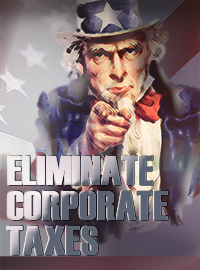| Stop the Corporate Punishment |
 |
|
By Quin Hillyer
Tuesday, April 03 2012 |
Americans businesses were turned into April Fools on Sunday when a cut in Japan's top corporate income tax rate left the United States with the highest such rate in the developed world -- including Communist China's. With Great Britain also slicing rates this month from 26 percent to 24 percent, the U.S. average top rate (federal and state combined) of 39.2 percent stands as a tremendous barrier to economic growth, higher incomes and job creation. Faced with evidence of the ill effects of these high American rates, even Bill Clinton and Barack Obama have paid lip service to cutting them. Yet they and others propose merely to nibble at the edges, from 35 percent to 28 percent. This isn't enough. There are good reasons to cut it at least in half, or perhaps to the 12.5 percent level that helped create the "Celtic Tiger" of unprecedented economic growth in Ireland. After Ireland's corporate tax cuts, its growth rate more than doubled U.S. growth; its per capita income surpassed ours; tax revenue actually increased each year until the start of the worldwide recession; and average salaries increased each year, including during the 2008-2010 recession. Likewise, as Chris Edwards of DownsizingGovernment.org noted in a March 13 Daily Caller column, Canada enjoyed steady corporate tax revenues for a quarter-century even after cutting its federal corporate rate from 38 percent to 15 percent. At that low rate, it collects a greater percentage of gross domestic product in federal revenues than the United States does with its 35 percent confiscation. The best idea, though, is to eliminate these taxes. The cost to federal coffers would be slim. Federal corporate income tax collections for each of the past three years have been less than $200 billion. Compare that to the $112 billion lost via the 2 percent payroll tax cut, which Congress and the president blithely passed as if revenue effects were unimportant. Now, consider that even without economic growth effects, much of the $200 billion "lost" would be recouped via existing taxes on dividends and capital gains, receipts from which, of course, would grow automatically. Another large chunk of revenue would be recouped when companies stopped outsourcing operations and instead rushed back to American shores to take advantage of the new tax regime, bringing profits with them and hiring huge numbers of American workers. Additionally, a zero rate would help keep consumer prices down, boost retiree and union pension funds and eliminate most businesses' tax compliance costs, freeing business accountants to concentrate on efficiencies rather than tax avoidance. It would also discourage debt financing in favor of safer equity financing and produce multitudinous growth effects. Among numerous other benefits, one bears particular emphasis. Half the lobbying in Washington is aimed not at securing pork or contracts, but at finagling special corporate tax treatment. Eliminate the tax, and we eliminate that lobbying -- and the incentives for graft that go with it. The repeal of corporate taxes would serve as a sort of backdoor ethics reform. Allow one small caveat: Eliminating this tax would significantly change the relative benefits of "S" corporations, limited partnerships and other exotica. Provisions would need to be made for handling these entities, and also to define "corporations" so as to avoid widespread "gaming of the system." So be it -- that's a definitional matter, far less complicated than much of the bureaucratic language-massaging that already occurs in the tax code. Corporate income taxes are complicated, inefficient and counterproductive. Whether eliminated or merely slashed significantly, they must come down. This article originally appeared in the April 2, 2012, edition of The Washington Examiner. |
Related Articles : |
























